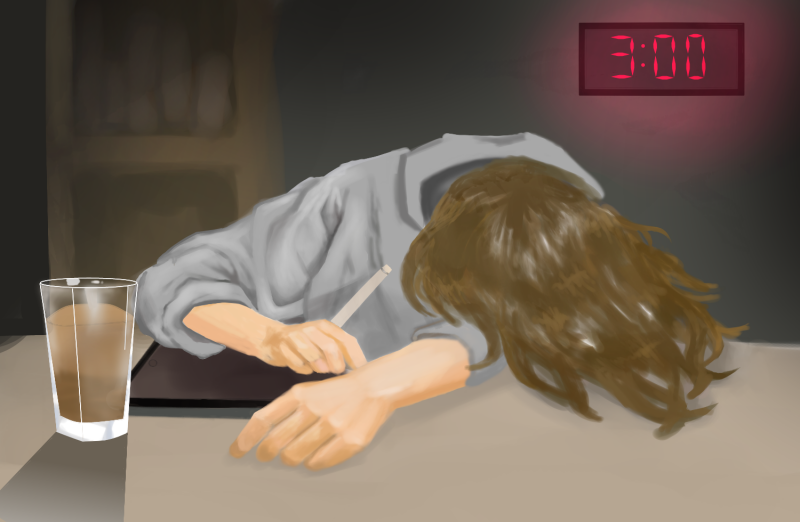Excused absences cover up inexcusable stigma
October 22, 2021
Monday morning. Your alarm goes off at 5:45, and you have an hour before your bus will come. You got five hours of sleep last night, and you still don’t feel quite prepared for your Physics test first period. You are taking the SAT next weekend, and you haven’t gotten to taking as many practice tests as you want to. As you tap through Snapchat stories, you realize that most of your classmates got only five hours of sleep as well. Some kids are even bragging about getting less. Even though all you want to do is fall back asleep, skipping class, you heave out of bed, never quite ready for the day to come.
Starting Jan. 1, 2022, all Illinois students will be able to take up to five mental health days off of school without needing a doctor’s note. These absences will be categorized as excused absences and teachers are required to give students additional time to finish missed assignments. After a student takes a second mental health day, their school counselor is required to follow up with the student to address their concerns and possibly refer them to a health professional.
State Senator Rob Martwick, co-sponsor of this bill, hopes that students understand “by removing that stigma that it was okay for them to address their mental health and seek the help that they need.” Martwick and his co-sponsors mean well as they respond to a 31% increase in mental health emergency hospital visits for teenagers. They, however, have failed in understanding what can truly reduce mental health stigma, endangering the prospects of this exciting new bill.
At high-pressure high schools across Illinois like Fremd, burnout is normalized. Struggling to cope with the demands of day-to-day life, teenagers often don’t have adults they can turn to share their concerns with. Counselors are hard to access via email and meetings and can often have an impersonal relationship with their students. High schoolers – worried about their future, sleep-deprived, and hormonal – may not have the hope that talking to their counselors or the administration can help solve their problems.
While allowing kids to have access to excused absences in order to manage their mental health is a great idea in theory, mental health days don’t touch the stigma around the topic. Teenagers, much like adults, do not spend their days studying the laws passed by their state legislatures. While lawmakers in Springfield can believe that the passage of this act shows kids that they can approach their school’s administration and ask for help, many kids probably don’t even know about this law. Those that do know about the law may be reluctant to use their excused absences in fear that a required referral to a mental health professional may lead to a diagnosis.
Students don’t need another way to take days off. They need to have access to a system they trust in a society they are comfortable in. We must all work toward having more conversations about mental health and normalizing getting help from a professional. By encouraging students, teachers, and parents to be more sensitive and kind when discussing mental health struggles, administrations can facilitate healthy discourse that enables students to feel comfortable using resources when they need them.
In addition to reduced stigma about mental health issues, schools need to restore confidence in their resources. Student-counselor relationships should be maintained throughout high school careers beyond course selection so that all students feel comfortable referring to their counselors in difficult times. Students should be informed of their options in seeking care so that the process of reaching out is demystified. While the heart of new legislation is in the right place, we should be striving to make existing systems adequate along with making provisions for excused absences.
The idea of excused absences for mental health struggles is great in theory and may succeed in practice. Still, it will not succeed if it is not built on a foundation of trust between students and their schools, and it will definitely not succeed without all of us showing more sensitivity and understanding towards kids and their struggles. As we all look to January to understand how this new law will play out, we must make sure we are also working to make students feel more comfortable approaching their schools for help.




